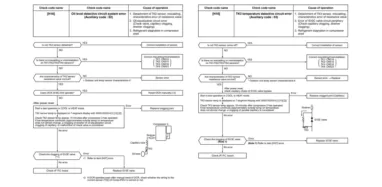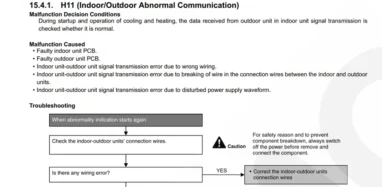In this modern world where pollution is getting worse and the global temperature continues to increase, an air conditioner is no longer mere luxury equipment in homes today. Since air conditioners came to existence, it has become the most common appliance in many homes to cool down the interior of your home, create a more comfortable environment, and improve air quality. A dual inverter air conditioner has become one of the top options for many homeowners today.
What are inverter air conditioners?
Air conditioners that don’t use inverter technology or is a non inverter air conditioner has limited function in terms of variability in operation and power consumption efficiency.
An inverter aircon can help you save lots of power since its consumed power can be adjusted depending on the operation required. When you turn on your inverter AC and set the desired temperature, the unit will run at full power in order to cool your room. But, once the temperature gets closer to the desired temperature, the unit’s power consumption is reduced. This will be reduced for as long as the preferred temperature is achieved.
When there is a lesser difference between the desired temperature, the compressor speed, and power consumption will be lesser as well. This means that inverter air conditioners can adjust their power consumption and compressor operation depending on the requirement.
It ensures highly efficient air conditioning. If the room’s temperature increases a bit from the preferred temperature, an inverter AC won’t start full capacity operation but will consume the same lower power consumption because of the reduced operation of the compressor.
What is a dual inverter air conditioner?
A dual inverter air conditioner is basically the advanced version of your simple inverter AC. This got the same capacity to lower power consumption based on the required operation but in a better way.
Dual inverter air conditioners use twin rotary compressors, unlike simple inverter air conditioners that only use a single rotary compressor. With a single rotary compressor, you will only find a single impeller or roller. But, a dual rotary compressor is made up of two impellers and rollers for the refrigerant’s compression.
Using two impellers needs lower rotational speed, unlike a single impeller compressor in order to compress and provide a similar refrigerant amount.
This ability to perform the same type of operation at a lower rotational speed with the delivery of the same quantity of compressed refrigerant as compared to a single rotary compressor that operates at a relatively higher speed is the reason why dual inverter air conditioners are considered to be more efficient.
Generally speaking, an inverter air conditioner tends to consume lesser power as compared to the non-inverter air conditioners. The difference is that a dual inverter air conditioner has a much lower power consumption compared to single rotary compressor inverter ACs and offers many other incentives.
The advantage of dual inverter air conditioner
Using dual inverter ACs can help lower your power consumption. But, it still has many other exciting benefits that can surely improve your air conditioning experience.
- Better stability and reduced vibration
Dual inverter air conditioners have two rollers or impellers for air compression. Both balance the centrifugal force being developed by each other which leads to reduced vibrations and better stability during the unit’s dynamic operation.
- Efficient operation and lower energy consumption
Dual inverter ACs can operate at very low consumption of power that is made possible by its use of a twin rotary compressor. Slower speeds also need a slower motor operational speed. These ACs also reduce electricity consumption by up to 70% compared to non-inverter ACs.
- Faster cooling
The twin compressor in a dual inverter AC comes with a couple of impellers with the capacity of providing more compressed refrigerant that will lead to faster cooling of air.
- Reduced noise
The reduced vibration because of the balanced impellers on both sides of the twin rotary compressor’s rotor shaft also decreases the noise that the compressor generates.
The disadvantage of dual inverter air conditioner
Dual inverter air conditioners are often marketed as amazing products that are more economical, use less power, are environment-friendly, have a quiet operation, and so much more. But, there are also other downsides of using these units that you need to know and consider before you decide to get one.
- High maintenance cost
Dual inverter air conditioners have several moving parts and sophisticated circuitry so the cost of maintenance will also be higher.
- High cost of operation if room is opened and closed frequently
The compressor in inverter ACs adjust the speed based on the room’s heat load. If the room has intermitted cooling leakage, the compressor will run at a much higher speed than increases power consumption as a result.
- High initial cost
Inverter ACs are often more expensive than normal ACs. Unless you don’t have a high electricity costs or you don’t have very heavy usage, it may take 5 to 7 years in order to recover the high initial cost of buying a dual inverter air conditioner.
- Insufficient cooling if there is extremely hot weather outdoors
It is reported that in places with temperatures of over 45oC, the cooling that dual inverter ACs achieve is insufficient because of the inadequate heat removal from the outdoor unit that pertains to the low compressor speed and high ambient temperature.
- Inadequate dehumidification
When it comes to dual inverter air conditioners, the achieved degree of chilling varies based on the heat loading that makes it inadequate in terms of dehumidification if the temperature set is not that low.
- Initial cooling delay
Compressors pace up to the preferred speed with programmed lag. Some amount of time is required before a dual inverter air conditioner achieves the desired cooling degree in the initial stage.
- Need for specialized technician
Since dual inverter ACs are made up of very sophisticated mechanisms, most of the time, less qualified and local technicians cannot understand the issue and may only worsen the problems instead of solving them properly.
Under and over-capacity effectiveness and uncommon refrigerant are other common issues associated with dual inverter air conditioners.
Is dual inverter window AC worth buying?
With dual inverter air conditioners enjoying increased popularity for the past few years, several brands are now rolling out their own versions of it, with each one of them having slight differences from the other. So, is it really worth it to buy a dual inverter window air conditioner?
Well, there are actually many reasons why buying a dual inverter window AC will give value for your money:
- Cooling methodology
A normal inverter air conditioner works with lowering the temperature just fine. However, it lacks the ability to efficiently maintain the preferred temperature. Normal AC compressors use BLDC motor that works through varying the compressor’s speed depending on the external demand.
Dual inverter ACs, on the other hand, use more advanced versions of BLDC motors together with twin rotation system. This offers better cooling when it comes to temperature control precision because of the valuable tonnage as well as the speed that it uses for cooling the room.
- Consumption of energy
Although normal inverter air conditioners moderate the consumption of energy, dual inverters are better in terms of efficiency. With their twin compressor, lower frequency rotation, and wider operational range, the dual inverter AC uses less energy, unlike normal inverter ACs.
- Less noise produced
When it comes to single inverter ACs, these make use of a single cylinder-shaped rotary compressor. The operation of a single compressor has extra requirements of the high-speed rotation that can lead to lots of vibration. If you are sitting in your living room, for example, you will notice and feel the increased noise level, particularly if you have only switched on the unit.
As far dual inverter air conditioners, with 180 degrees phase difference, the unit works to promote a more stable operation at higher capacities. The stable operation will mean less whirring, fewer vibrations, and lesser noise. Most companies offer a pin-drop silence guarantee that gives you the assurance that you will be enjoying quality time with your family and loved ones.
Installing dual inverter air conditioner
Learning how to install a dual inverter air conditioner is essential. When the installation is done properly and accurately, you can expect that your unit will let you enjoy optimum cooling. On the other hand, if done the wrong way, you will not be able to achieve the cooling effect that you desire. Poor installations can also result in frequent maintenance issues.
Some factors that you need to consider when installing a dual inverter air conditioner include the following:
- Strength of wall that will hold the unit
- Proper spacing between the AC unit and the wall
- Appropriate height of installation from the ground
- Correct tilt angle of the indoor unit
- Correct location of the outdoor unit
- Correct placement of the outdoor unit
- Right distance between the outdoor and indoor unit
The Bottom Line
A dual inverter air conditioner is a great choice to consider if you want to keep your home cool and comfy. Is voltage stabilizer required for inverter ac?

